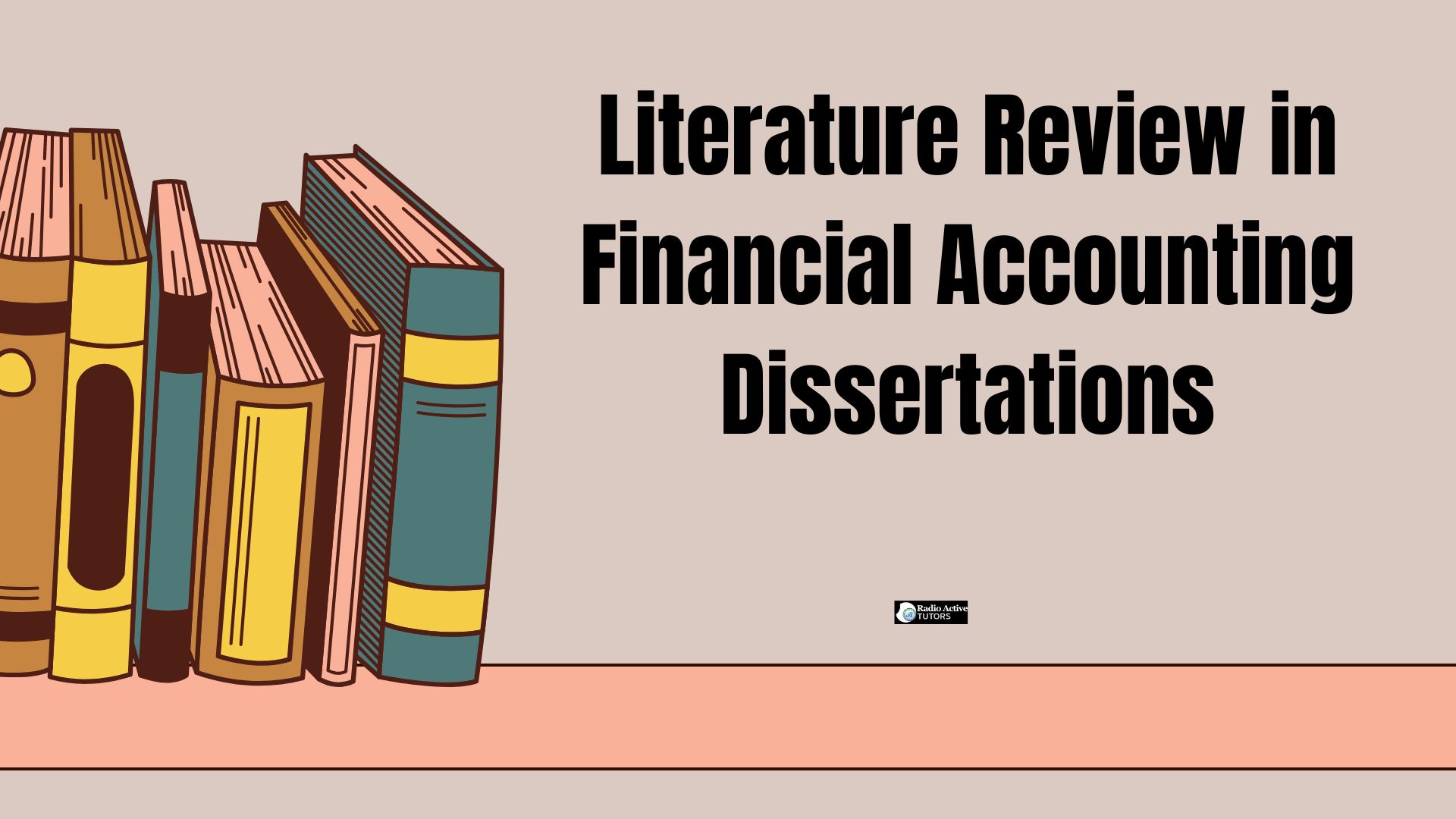Table of Contents
I. Introduction to Financial Accounting Dissertations
II. Choosing a Topic for Your Financial Accounting Dissertation
III. Research Methodologies in Financial Accounting Dissertations
IV. Literature Review in Financial Accounting Dissertations
V. Developing a Research Proposal
VI. Data Analysis and Interpretation
VII. Writing the Dissertation: Structure and Format
VIII. Frequently Asked Questions (FAQs) about Financial Accounting Dissertations
I. Introduction to Financial Accounting Dissertations
- What are financial accounting dissertations?

Financial accounting dissertations are comprehensive research projects that delve into various aspects of financial reporting, analysis, and management within organizations. These dissertations typically explore topics such as financial statement analysis, auditing practices, regulatory compliance, corporate governance, and the impact of accounting standards on financial decision-making. They involve rigorous investigation, data collection, and analysis to contribute new insights, theories, or methodologies to the field of financial accounting.
Financial accounting dissertations may focus on theoretical frameworks, empirical studies, case analyses, or policy evaluations, depending on the research objectives and methodologies employed by the researcher. Overall, financial accounting dissertations are scholarly endeavors aimed at advancing knowledge and understanding within the discipline of financial accounting.
- Importance of financial accounting dissertations in academia
Financial accounting dissertations hold significant importance in academia for several reasons. Firstly, they contribute to the advancement of knowledge and understanding within the field of financial accounting by exploring new theories, methodologies, and empirical findings. These dissertations expand the scholarly literature, providing valuable insights and perspectives that can inform future research and practice. Secondly, financial accounting dissertations play a crucial role in the education and professional development of students pursuing advanced degrees in accounting or related fields.
They offer students an opportunity to engage in independent research, hone their analytical skills, and demonstrate their ability to apply theoretical concepts to real-world problems. Additionally, financial accounting dissertations may influence policy decisions, regulatory frameworks, and industry practices, thereby shaping the broader landscape of financial reporting and analysis. Overall, financial accounting dissertations are integral to the academic discourse, professional development, and practical application of financial accounting principles and practices.
- Overview of the structure of financial accounting dissertations
The structure of financial accounting dissertations typically follows a standardized format designed to facilitate clear organization and effective communication of research findings. Generally, these dissertations consist of several key sections, including an introduction, literature review, research methodology, results, discussion, and conclusion. The introduction sets the stage by providing background information, articulating the research question or objectives, and outlining the scope and significance of the study. The literature review critically evaluates existing research and theoretical frameworks relevant to the topic, identifying gaps or areas for further investigation. The research methodology section describes the methods and procedures employed to collect and analyze data, ensuring transparency and replicability of the study.
Results present the findings of the research, often accompanied by tables, charts, or statistical analysis. The discussion interprets the results in relation to the research question, exploring implications, limitations, and future directions for research. Finally, the conclusion summarizes the key findings, highlights the contributions of the study, and offers recommendations for future research or practice. Overall, the structure of financial accounting dissertations provides a coherent framework for conducting and presenting scholarly research in the field of financial accounting.
II. Choosing a Topic for Your Financial Accounting Dissertation
- Identifying current trends and issues in financial accounting
Choosing a topic for a financial accounting dissertation begins with identifying current trends and issues in the field. This process involves conducting a thorough review of recent literature, industry reports, and regulatory developments to pinpoint areas of interest and relevance. Current trends may include emerging technologies such as blockchain and artificial intelligence in financial reporting, shifts in regulatory frameworks such as the adoption of international accounting standards, or evolving practices in sustainability reporting and corporate social responsibility.
Likewise, identifying pressing issues such as financial fraud, earnings management, or the implications of globalization on financial reporting can also serve as fruitful topics for research. By staying attuned to current trends and issues, researchers can ensure that their dissertation topics are timely, relevant, and contribute meaningfully to the advancement of knowledge in financial accounting.
- Selecting a niche area for research

Selecting a niche area for research is a critical step in choosing a topic for a financial accounting dissertation. This process involves narrowing down broad topics into specific areas of inquiry that offer opportunities for original research and scholarly contribution. Researchers may consider factors such as their personal interests, expertise, and career goals, as well as the relevance and significance of the chosen niche within the broader field of financial accounting.
Niche areas for research may include specialized topics such as forensic accounting, accounting for sustainability, or the intersection of accounting and technology. By selecting a niche area, researchers can focus their efforts, delve deeply into specific issues, and make meaningful contributions to the academic discourse in financial accounting. Moreover, exploring niche areas may uncover new insights, theories, or methodologies that have the potential to advance knowledge and practice in the field.
- Brainstorming potential research questions
Brainstorming potential research questions is a vital stage in the process of choosing a topic for a financial accounting dissertation. This phase involves generating a range of inquiries that address gaps, controversies, or emerging trends in the field of financial accounting. Researchers may draw inspiration from current literature, industry reports, practical challenges, or theoretical frameworks to formulate research questions that are relevant, original, and intellectually stimulating. These questions should be specific enough to guide focused investigation yet broad enough to allow for meaningful exploration and analysis.
By engaging in brainstorming, researchers can identify promising avenues for research, refine their research interests, and ultimately select a dissertation topic that aligns with their academic goals and interests while making a valuable contribution to the field of financial accounting.
III. Research Methodologies in Financial Accounting Dissertations
- Qualitative vs. quantitative research approaches
In research methodologies for financial accounting dissertations, scholars often choose between qualitative and quantitative approaches to investigate complex accounting phenomena. Qualitative research involves exploring subjective experiences, perceptions, and meanings through methods such as interviews, case studies, or content analysis. This approach allows researchers to gain in-depth insights into the context, motivations, and behaviors of individuals or organizations within the accounting domain. On the other hand, quantitative research employs numerical data and statistical analysis to measure relationships, test hypotheses, and generalize findings across populations.
Quantitative methods, such as surveys, experiments, or regression analysis, enable researchers to quantify variables, identify patterns, and draw statistically valid conclusions about cause-and-effect relationships. Both qualitative and quantitative research approaches offer unique strengths and limitations, and researchers must carefully consider their research questions, objectives, and epistemological assumptions when selecting the most appropriate methodology for their financial accounting dissertations.
- Survey methods and data collection techniques
Survey methods and data collection techniques are integral components of research methodologies in financial accounting dissertations. Surveys involve systematically gathering information from a sample of individuals or organizations through structured questionnaires or interviews. These methods allow researchers to collect quantitative or qualitative data on a wide range of topics, such as financial reporting practices, audit procedures, or corporate governance structures. Surveys offer the advantage of efficiently gathering large amounts of data from diverse respondents, providing insights into prevailing attitudes, behaviors, and practices within the accounting profession.
Additionally, researchers may employ various data collection techniques, including online surveys, telephone interviews, or mailed questionnaires, to reach different populations and maximize response rates. By utilizing survey methods and data collection techniques, researchers can gather empirical evidence, test hypotheses, and contribute valuable insights to the body of knowledge in financial accounting.
- Case study analysis in financial accounting research
Case study analysis is a valuable research methodology employed in financial accounting dissertations to investigate complex real-world phenomena within organizational contexts. This approach involves in-depth examination and interpretation of specific cases, such as corporate scandals, financial reporting practices, or audit failures, to understand underlying dynamics, processes, and outcomes. Researchers may use a variety of data sources, including financial statements, internal documents, interviews, and archival records, to reconstruct the narrative of the case and analyze key events, decisions, and outcomes.
Case study analysis offers the advantage of providing rich, detailed insights into the complexities and nuances of accounting practices, allowing researchers to explore causal mechanisms, contextual factors, and stakeholder perspectives. Moreover, case studies enable researchers to generate theory, develop conceptual frameworks, and derive practical implications that contribute to the advancement of knowledge and practice in financial accounting. Through rigorous case study analysis, researchers can uncover valuable lessons, identify best practices, and inform policy decisions, thereby enhancing the relevance and impact of their financial accounting dissertations.
IV. Literature Review in Financial Accounting Dissertations

- Importance of literature review in dissertation writing
The literature review plays a crucial role in financial accounting dissertations by providing a comprehensive overview of existing scholarship relevant to the research topic. This section synthesizes and analyzes a wide range of academic sources, including scholarly articles, books, reports, and regulatory documents, to establish the theoretical and empirical foundations of the dissertation. By examining previous research, the literature review identifies gaps, inconsistencies, and areas for further investigation, guiding the development of research questions and hypotheses.
Moreover, the literature review helps researchers situate their study within the broader academic discourse, demonstrating familiarity with key concepts, debates, and theoretical frameworks in the field of financial accounting. Additionally, the literature review highlights methodological approaches used in previous studies, informing researchers’ decisions about research design, data collection, and analysis methods. Overall, the literature review is essential for providing context, rationale, and theoretical grounding for the research undertaken in financial accounting dissertations.
- Identifying relevant sources and scholarly articles
Identifying relevant sources and scholarly articles is a crucial step in conducting a thorough literature review for financial accounting dissertations. Researchers must systematically search academic databases, library catalogs, and relevant journals to locate peer-reviewed articles, books, and reports that address the research topic. Additionally, researchers may explore regulatory documents, industry publications, and conference proceedings to ensure comprehensive coverage of the literature.
The selection of relevant sources is guided by the research questions, objectives, and theoretical frameworks of the dissertation, as well as the quality and credibility of the sources. By identifying and critically evaluating relevant sources, researchers can build a robust foundation of knowledge, identify key concepts and debates, and gain insights into the current state of research in the field of financial accounting. This process lays the groundwork for synthesizing and analyzing the literature to inform the research undertaken in financial accounting dissertations.
- Analyzing and synthesizing existing research in financial accounting
Analyzing and synthesizing existing research in financial accounting is a critical component of the literature review in financial accounting dissertations. This process involves systematically examining a wide range of scholarly sources, including peer-reviewed articles, books, reports, and regulatory documents, to identify key themes, trends, and findings relevant to the research topic. Researchers must critically evaluate the strengths and limitations of individual studies, assess the consistency and reliability of empirical evidence, and identify areas of agreement, disagreement, or controversy within the literature.
By synthesizing existing research, researchers can develop a comprehensive understanding of the current state of knowledge in the field of financial accounting, identify gaps or inconsistencies in the literature, and generate insights that inform their own research questions, hypotheses, and methodologies. This critical analysis and synthesis of existing research are essential for establishing the theoretical and empirical foundations of financial accounting dissertations and for contributing new knowledge to the field.
V. Developing a Research Proposal
- Components of a research proposal
Developing a research proposal for financial accounting dissertations involves outlining key components that provide a clear and comprehensive overview of the planned research. These components typically include the introduction, research objectives, literature review, research methodology, data analysis plan, and timeline. The introduction sets the stage by providing background information, articulating the research problem or question, and explaining the significance of the study. The research objectives outline the specific aims and objectives of the research, guiding the overall direction of the study. The literature review critically evaluates existing scholarship relevant to the research topic, identifying gaps, controversies, or areas for further investigation.
The research methodology describes the methods and procedures that will be used to collect and analyze data, ensuring the reliability and validity of the study. The data analysis plan outlines how the collected data will be analyzed to address the research objectives and test hypotheses. Finally, the timeline provides a detailed schedule of key milestones and activities, ensuring that the research is completed in a timely manner. Together, these components form a comprehensive research proposal that serves as a roadmap for conducting the financial accounting dissertation.
- Crafting a clear research question and objectives

Crafting a clear research question and objectives is a foundational step in developing a research proposal for financial accounting dissertations. The research question serves as the focal point of the study, guiding the direction and scope of the research. It should be specific, focused, and relevant to the field of financial accounting, addressing a significant gap or problem in the existing literature. Alongside the research question, clear and measurable research objectives are articulated to delineate the specific aims and goals of the study.
These objectives outline the intended outcomes of the research, providing a framework for data collection, analysis, and interpretation. By crafting a clear research question and objectives, researchers establish a solid foundation for their proposed study, ensuring that the research is focused, coherent, and purposeful.
- Justifying the significance of the research
Justifying the significance of the research is a crucial aspect of developing a research proposal for financial accounting dissertations. This involves articulating why the proposed study is important and how it contributes to the advancement of knowledge within the field of financial accounting. Researchers must demonstrate the relevance of their research topic to current debates, practical challenges, or theoretical developments in financial accounting.
Additionally, they should highlight the potential implications of their research findings for academia, practice, and policy-making. By justifying the significance of the research, researchers establish the relevance and value of their proposed study, garnering support and interest from stakeholders such as academic advisors, funding agencies, and potential collaborators. Ultimately, this justification ensures that the proposed research is grounded in a clear understanding of its broader impact and relevance within the field of financial accounting.
VI. Data Analysis and Interpretation
- Tools and techniques for data analysis
In data analysis and interpretation for financial accounting dissertations, researchers employ a variety of tools and techniques to analyze and make sense of the collected data. These tools may include statistical software packages such as SPSS, STATA, or R for quantitative analysis, which enable researchers to perform descriptive statistics, regression analysis, and hypothesis testing. Additionally, qualitative data analysis techniques such as thematic analysis, content analysis, or grounded theory may be used to analyze textual or interview data. These qualitative methods allow researchers to identify patterns, themes, and relationships within the data, providing rich insights into complex phenomena.
Moreover, data visualization tools such as charts, graphs, and tables are often employed to present the findings in a clear and visually appealing manner. By leveraging these tools and techniques for data analysis, researchers can rigorously analyze their data, derive meaningful insights, and draw valid conclusions that contribute to the body of knowledge in financial accounting.
- Interpreting findings and drawing conclusions
Interpreting findings and drawing conclusions are crucial steps in data analysis and interpretation for financial accounting dissertations. After analyzing the collected data using appropriate tools and techniques, researchers must interpret the findings within the context of their research objectives and theoretical framework. This involves identifying patterns, trends, and relationships in the data, as well as assessing their implications for the research questions or hypotheses. Researchers must critically evaluate the strengths and limitations of their findings, considering factors such as sample size, data reliability, and potential biases.
Based on their interpretation of the findings, researchers then draw conclusions that address the research objectives and contribute to the broader understanding of the topic. These conclusions should be supported by the evidence presented in the data analysis, providing insights, recommendations, or implications for theory, practice, or policy in the field of financial accounting. By carefully interpreting findings and drawing well-supported conclusions, researchers ensure that their data analysis and interpretation process is rigorous, valid, and contributes meaningfully to the research literature.
- Addressing limitations and implications of the research
Addressing limitations and implications of the research is an essential aspect of data analysis and interpretation in financial accounting dissertations. Researchers must critically reflect on the limitations of their study, including methodological constraints, sample biases, data reliability issues, or theoretical constraints. By acknowledging these limitations, researchers demonstrate transparency and integrity in their research process, while also identifying opportunities for future research to address these limitations.
Additionally, researchers must consider the broader implications of their findings for theory, practice, and policy in the field of financial accounting. This involves discussing how the research contributes to existing knowledge, identifies areas for further investigation, or informs decision-making in professional contexts. By addressing limitations and implications, researchers ensure that their research is situated within the larger context of the field, and that its contributions and potential impact are clearly articulated and understood.
VII. Writing the Dissertation: Structure and Format

Writing the dissertation for financial accounting research involves careful attention to structure and formatting to effectively communicate research findings and insights. Typically, the dissertation follows a standard structure comprising several key sections. These sections include the introduction, literature review, research methodology, data analysis and interpretation, discussion of findings, conclusions, and recommendations. Each section serves a specific purpose in presenting and analyzing the research.
Additionally, adhering to appropriate formatting guidelines, such as those specified by academic institutions or journal publishers, ensures consistency and professionalism in the presentation of the dissertation. Proper formatting includes aspects such as font size and style, margins, spacing, headings, and citations. By adhering to a clear structure and formatting guidelines, researchers can enhance the readability and accessibility of their dissertation, facilitating the dissemination of their research findings to academic and professional audiences in the field of financial accounting.
VIII. Frequently Asked Questions (FAQs) about Financial Accounting Dissertations
- What are some trending topics in financial accounting research?
- How do I narrow down my research focus for a dissertation?
- What is the difference between a literature review and a theoretical framework?
- How do I ensure that my research is original and not plagiarized?
- What are the common challenges faced by students when writing financial accounting dissertations?
- Can I use qualitative research methods in financial accounting dissertations?
- How important is the research proposal in the dissertation writing process?
- What are some ethical considerations in financial accounting research?
- How do I effectively present my research findings in the dissertation?
- What should I do if my dissertation supervisor suggests revisions?
- Are there any specific formatting guidelines for financial accounting dissertations?
- How long does it typically take to complete a financial accounting dissertation?
